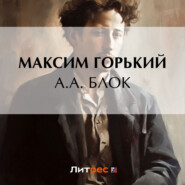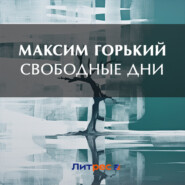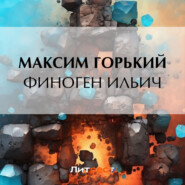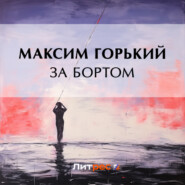По всем вопросам обращайтесь на: info@litportal.ru
(©) 2003-2025.
✖
Mother
Настройки чтения
Размер шрифта
Высота строк
Поля
Pyotr timidly assented:
"Yes, he mustn't look back."
"The work has spread very widely," continued Stepan.
"Over the whole earth," added Pyotr.
They both spoke like men walking in darkness, groping for the way with their feet. The mother leaned against the wall, and throwing back her head listened to their careful utterances. Tatyana arose, looked around, and sat down again. Her green eyes gleamed dryly as she looked into the peasants' faces with dissatisfaction and contempt.
"It seems you've been through a lot of misery," she said, suddenly turning to the mother.
"I have."
"You speak well. You draw – you draw the heart after your talk. It makes me think, it makes me think, 'God! If I could only take a peep at such people and at life through a chink!' How does one live? What life has one? The life of sheep. Here am I; I can read and write; I read books, I think a whole lot. Sometimes I don't even sleep the entire night because I think. And what sense is there in it? If I don't think, my existence is a purposeless existence; and if I do, it is also purposeless. And everything seems purposeless. There are the peasants, who work and tremble over a piece of bread for their homes, and they have nothing. It hurts them, enrages them; they drink, fight, and work again – work, work, work. But what comes of it? Nothing."
She spoke with scorn in her eyes and in her voice, which was low and even, but at times broke off like a taut thread overstrained. The peasants were silent, the wind glided by the window panes, buzzed through the straw of the roofs, and at times whined softly down the chimney. A dog barked, and occasional drops of rain pattered on the window. Suddenly the light flared in the lamp, dimmed, but in a second sprang up again even and bright.
"I listened to your talk, and I see what people live for now. It's so strange – I hear you, and I think, 'Why, I know all this.' And yet, until you said it, I hadn't heard such things, and I had no such thoughts. Yes."
"I think we ought to take something to eat, and put out the lamp," said Stepan, somberly and slowly. "People will notice that at the Chumakovs' the light burned late. It's nothing for us, but it might turn out bad for the guest."
Tatyana arose and walked to the oven.
"Ye-es," Pyotr said softly, with a smile. "Now, friend, keep your ears pricked. When the papers appear among the people – "
"I'm not speaking of myself. If they arrest me, it's no great matter."
The wife came up to the table and asked Stepan to make room.
He arose and watched her spread the table as he stood to one side.
"The price of fellows of our kind is a nickel a bundle, a hundred in a bundle," he said with a smile.
The mother suddenly pitied him. He now pleased her more.
"You don't judge right, host," she said. "A man mustn't agree to the price put upon him by people from the outside, who need nothing of him except his blood. You, knowing yourself within, must put your own estimate on yourself – your price, not for your enemies, but for your friends."
"What friends have we?" the peasant exclaimed softly. "Up to the first piece of bread."
"And I say that the people have friends."
"Yes, they have, but not here – that's the trouble," Stepan deliberated.
"Well, then create them here."
Stepan reflected a while. "We'll try."
"Sit down at the table," Tatyana invited her.
At supper, Pyotr, who had been subdued by the talk of the mother and appeared to be at a loss, began to speak again with animation:
"Mother, you ought to get out of here as soon as possible, to escape notice. Go to the next station, not to the city – hire the post horses."
"Why? I'm going to see her off!" said Stepan.
"You mustn't. In case anything happens and they ask you whether she slept in your house – 'She did.' 'When did she go?' 'I saw her off.' 'Aha! You did? Please come to prison!' Do you understand? And no one ought to be in a hurry to get into prison; everybody's turn will come. 'Even the Czar will die,' as the saying goes. But the other way: she simply spent the night in your house, hired horses, and went away. And what of it? Somebody passing through the village sleeps with somebody in the village. There's nothing in that."
"Where did you learn to be afraid, Pyotr?" Tatyana scoffed.
"A man must know everything, friend!" Pyotr exclaimed, striking his knee – "know how to fear, know how to be brave. You remember how a policeman lashed Vaganov for that newspaper? Now you'll not persuade Vaganov for any amount of money to take a book in his hand. Yes; you believe me, mother, I'm a sharp fellow for every sort of a trick – everybody knows it. I'm going to scatter these books and papers for you in the best shape and form, as much as you please. Of course, the people here are not educated; they've been intimidated. However, the times squeeze a man and wide open go his eyes, 'What's the matter?' And the book answers him in a perfectly simple way: 'That's what's the matter – Think! Unite! Nothing else is left for you to do!' There are examples of men who can't read or write and can understand more than the educated ones – especially if the educated ones have their stomachs full. I go about here everywhere; I see much. Well? It's possible to live; but you want brains and a lot of cleverness in order not to sit down in the cesspool at once. The authorities, too, smell a rat, as though a cold wind were blowing on them from the peasants. They see the peasant smiles very little, and altogether is not very kindly disposed and wants to disaccustom himself to the authorities. The other day in Smolyakov, a village not far from here, they came to extort the taxes; and your peasants got stubborn and flew into a passion. The police commissioner said straight out: 'Oh, you damned scoundrels! why, this is disobedience to the Czar!' There was one little peasant there, Spivakin, and says he: 'Off with you to the evil mother with your Czar! What kind of a Czar is he if he pulls the last shirt off your body?' That's how far it went, mother. Of course, they snatched Spivakin off to prison. But the word remained, and even the little boys know it. It lives! It shouts! And perhaps in our days the word is worth more than a man. People are stupefied and deadened by their absorption in breadwinning. Yes."
Pyotr did not eat, but kept on talking in a quick whisper, his dark, roguish eyes gleaming merrily. He lavishly scattered before the mother innumerable little observations on the village life – they rolled from him like copper coins from a full purse.
Stepan several times reminded him: "Why don't you eat?" Pyotr would then seize a piece of bread and a spoon and fall to talking and sputtering again like a goldfinch. Finally, after the meal, he jumped to his feet and announced:
"Well, it's time for me to go home. Good-by, mother!" and he shook her hand and nodded his head. "Maybe we shall never see each other again. I must say to you that all this is very good – to meet you and hear your speeches – very good! Is there anything in your valise beside the printed matter? A shawl? Excellent! A shawl, remember, Stepan. He'll bring you the valise at once. Come, Stepan. Good-by. I wish everything good to you."
After he had gone the crawling sound of the roaches became audible in the hut, the blowing of the wind over the roof and its knocking against the door in the chimney. A fine rain dripped monotonously on the window. Tatyana prepared a bed for the mother on the bench with clothing brought from the oven and the storeroom.
"A lively man!" remarked the mother.
The hostess looked at her sidewise.
"A light fellow," she answered. "He rattles on and rattles on; you can't but hear the rattling at a great distance."
"And how is your husband?" asked the mother.
"So so. A good peasant; he doesn't drink; we live peacefully. So so. Only he has a weak character." She straightened herself, and after a pause asked:
"Why, what is it that's wanted nowadays? What's wanted is that the people should be stirred up to revolt. Of course! Everybody thinks about it, but privately, for himself. And what's necessary is that he should speak out aloud. Some one person must be the first to decide to do it." She sat down on the bench and suddenly asked: "Tell me, do young ladies also occupy themselves with this? Do they go about with the workingmen and read? Aren't they squeamish and afraid?" She listened attentively to the mother's reply and fetched a deep sigh; then drooping her eyelids and inclining her head, she said: "In one book I read the words 'senseless life.' I understood them very well at once. I know such a life. Thoughts there are, but they're not connected, and they stray like stupid sheep without a shepherd. They stray and stray, with no one to bring them together. There's no understanding in people of what must be done. That's what a senseless life is. I'd like to run away from it without even looking around – such a severe pang one suffers when one understands something!"
The mother perceived the pang in the dry gleam of the woman's green eyes, in her wizened face, in her voice. She wanted to pet and soothe her.
"You understand, my dear, what to do – "
Tatyana interrupted her softly:
"A person must be able – The bed's ready for you. Lie down and sleep."
She went over to the oven and remained standing there erect, in silence, sternly centered in herself. The mother lay down without undressing. She began to feel the weariness in her bones and groaned softly. Tatyana walked up to the table, extinguished the lamp, and when darkness descended on the hut she resumed speech in her low, even voice, which seemed to erase something from the flat face of the oppressive darkness.
"You do not pray? I, too, think there is no God, there are no miracles. All these things were contrived to frighten us, to make us stupid."
The mother turned about on the bench uneasily; the dense darkness looked straight at her from the window, and the scarcely audible crawling of the roaches persistently disturbed the quiet. She began to speak almost in a whisper and fearfully:
"In regard to God, I don't know; but I do believe in Christ, in the Little Father. I believe in his words, 'Love thy neighbor as thyself.' Yes, I believe in them." And suddenly she asked in perplexity: "But if there is a God, why did He withdraw his good power from us? Why did He allow the division of people into two worlds? Why, if He is merciful, does He permit human torture – the mockery of one man by another, all kinds of evil and beastliness?"
Tatyana was silent. In the darkness the mother saw the faint outline of her straight figure – gray on the black background. She stood motionless. The mother closed her eyes in anguish. Then the groaning, cold voice sullenly broke in upon the stillness again:
"Yes, he mustn't look back."
"The work has spread very widely," continued Stepan.
"Over the whole earth," added Pyotr.
They both spoke like men walking in darkness, groping for the way with their feet. The mother leaned against the wall, and throwing back her head listened to their careful utterances. Tatyana arose, looked around, and sat down again. Her green eyes gleamed dryly as she looked into the peasants' faces with dissatisfaction and contempt.
"It seems you've been through a lot of misery," she said, suddenly turning to the mother.
"I have."
"You speak well. You draw – you draw the heart after your talk. It makes me think, it makes me think, 'God! If I could only take a peep at such people and at life through a chink!' How does one live? What life has one? The life of sheep. Here am I; I can read and write; I read books, I think a whole lot. Sometimes I don't even sleep the entire night because I think. And what sense is there in it? If I don't think, my existence is a purposeless existence; and if I do, it is also purposeless. And everything seems purposeless. There are the peasants, who work and tremble over a piece of bread for their homes, and they have nothing. It hurts them, enrages them; they drink, fight, and work again – work, work, work. But what comes of it? Nothing."
She spoke with scorn in her eyes and in her voice, which was low and even, but at times broke off like a taut thread overstrained. The peasants were silent, the wind glided by the window panes, buzzed through the straw of the roofs, and at times whined softly down the chimney. A dog barked, and occasional drops of rain pattered on the window. Suddenly the light flared in the lamp, dimmed, but in a second sprang up again even and bright.
"I listened to your talk, and I see what people live for now. It's so strange – I hear you, and I think, 'Why, I know all this.' And yet, until you said it, I hadn't heard such things, and I had no such thoughts. Yes."
"I think we ought to take something to eat, and put out the lamp," said Stepan, somberly and slowly. "People will notice that at the Chumakovs' the light burned late. It's nothing for us, but it might turn out bad for the guest."
Tatyana arose and walked to the oven.
"Ye-es," Pyotr said softly, with a smile. "Now, friend, keep your ears pricked. When the papers appear among the people – "
"I'm not speaking of myself. If they arrest me, it's no great matter."
The wife came up to the table and asked Stepan to make room.
He arose and watched her spread the table as he stood to one side.
"The price of fellows of our kind is a nickel a bundle, a hundred in a bundle," he said with a smile.
The mother suddenly pitied him. He now pleased her more.
"You don't judge right, host," she said. "A man mustn't agree to the price put upon him by people from the outside, who need nothing of him except his blood. You, knowing yourself within, must put your own estimate on yourself – your price, not for your enemies, but for your friends."
"What friends have we?" the peasant exclaimed softly. "Up to the first piece of bread."
"And I say that the people have friends."
"Yes, they have, but not here – that's the trouble," Stepan deliberated.
"Well, then create them here."
Stepan reflected a while. "We'll try."
"Sit down at the table," Tatyana invited her.
At supper, Pyotr, who had been subdued by the talk of the mother and appeared to be at a loss, began to speak again with animation:
"Mother, you ought to get out of here as soon as possible, to escape notice. Go to the next station, not to the city – hire the post horses."
"Why? I'm going to see her off!" said Stepan.
"You mustn't. In case anything happens and they ask you whether she slept in your house – 'She did.' 'When did she go?' 'I saw her off.' 'Aha! You did? Please come to prison!' Do you understand? And no one ought to be in a hurry to get into prison; everybody's turn will come. 'Even the Czar will die,' as the saying goes. But the other way: she simply spent the night in your house, hired horses, and went away. And what of it? Somebody passing through the village sleeps with somebody in the village. There's nothing in that."
"Where did you learn to be afraid, Pyotr?" Tatyana scoffed.
"A man must know everything, friend!" Pyotr exclaimed, striking his knee – "know how to fear, know how to be brave. You remember how a policeman lashed Vaganov for that newspaper? Now you'll not persuade Vaganov for any amount of money to take a book in his hand. Yes; you believe me, mother, I'm a sharp fellow for every sort of a trick – everybody knows it. I'm going to scatter these books and papers for you in the best shape and form, as much as you please. Of course, the people here are not educated; they've been intimidated. However, the times squeeze a man and wide open go his eyes, 'What's the matter?' And the book answers him in a perfectly simple way: 'That's what's the matter – Think! Unite! Nothing else is left for you to do!' There are examples of men who can't read or write and can understand more than the educated ones – especially if the educated ones have their stomachs full. I go about here everywhere; I see much. Well? It's possible to live; but you want brains and a lot of cleverness in order not to sit down in the cesspool at once. The authorities, too, smell a rat, as though a cold wind were blowing on them from the peasants. They see the peasant smiles very little, and altogether is not very kindly disposed and wants to disaccustom himself to the authorities. The other day in Smolyakov, a village not far from here, they came to extort the taxes; and your peasants got stubborn and flew into a passion. The police commissioner said straight out: 'Oh, you damned scoundrels! why, this is disobedience to the Czar!' There was one little peasant there, Spivakin, and says he: 'Off with you to the evil mother with your Czar! What kind of a Czar is he if he pulls the last shirt off your body?' That's how far it went, mother. Of course, they snatched Spivakin off to prison. But the word remained, and even the little boys know it. It lives! It shouts! And perhaps in our days the word is worth more than a man. People are stupefied and deadened by their absorption in breadwinning. Yes."
Pyotr did not eat, but kept on talking in a quick whisper, his dark, roguish eyes gleaming merrily. He lavishly scattered before the mother innumerable little observations on the village life – they rolled from him like copper coins from a full purse.
Stepan several times reminded him: "Why don't you eat?" Pyotr would then seize a piece of bread and a spoon and fall to talking and sputtering again like a goldfinch. Finally, after the meal, he jumped to his feet and announced:
"Well, it's time for me to go home. Good-by, mother!" and he shook her hand and nodded his head. "Maybe we shall never see each other again. I must say to you that all this is very good – to meet you and hear your speeches – very good! Is there anything in your valise beside the printed matter? A shawl? Excellent! A shawl, remember, Stepan. He'll bring you the valise at once. Come, Stepan. Good-by. I wish everything good to you."
After he had gone the crawling sound of the roaches became audible in the hut, the blowing of the wind over the roof and its knocking against the door in the chimney. A fine rain dripped monotonously on the window. Tatyana prepared a bed for the mother on the bench with clothing brought from the oven and the storeroom.
"A lively man!" remarked the mother.
The hostess looked at her sidewise.
"A light fellow," she answered. "He rattles on and rattles on; you can't but hear the rattling at a great distance."
"And how is your husband?" asked the mother.
"So so. A good peasant; he doesn't drink; we live peacefully. So so. Only he has a weak character." She straightened herself, and after a pause asked:
"Why, what is it that's wanted nowadays? What's wanted is that the people should be stirred up to revolt. Of course! Everybody thinks about it, but privately, for himself. And what's necessary is that he should speak out aloud. Some one person must be the first to decide to do it." She sat down on the bench and suddenly asked: "Tell me, do young ladies also occupy themselves with this? Do they go about with the workingmen and read? Aren't they squeamish and afraid?" She listened attentively to the mother's reply and fetched a deep sigh; then drooping her eyelids and inclining her head, she said: "In one book I read the words 'senseless life.' I understood them very well at once. I know such a life. Thoughts there are, but they're not connected, and they stray like stupid sheep without a shepherd. They stray and stray, with no one to bring them together. There's no understanding in people of what must be done. That's what a senseless life is. I'd like to run away from it without even looking around – such a severe pang one suffers when one understands something!"
The mother perceived the pang in the dry gleam of the woman's green eyes, in her wizened face, in her voice. She wanted to pet and soothe her.
"You understand, my dear, what to do – "
Tatyana interrupted her softly:
"A person must be able – The bed's ready for you. Lie down and sleep."
She went over to the oven and remained standing there erect, in silence, sternly centered in herself. The mother lay down without undressing. She began to feel the weariness in her bones and groaned softly. Tatyana walked up to the table, extinguished the lamp, and when darkness descended on the hut she resumed speech in her low, even voice, which seemed to erase something from the flat face of the oppressive darkness.
"You do not pray? I, too, think there is no God, there are no miracles. All these things were contrived to frighten us, to make us stupid."
The mother turned about on the bench uneasily; the dense darkness looked straight at her from the window, and the scarcely audible crawling of the roaches persistently disturbed the quiet. She began to speak almost in a whisper and fearfully:
"In regard to God, I don't know; but I do believe in Christ, in the Little Father. I believe in his words, 'Love thy neighbor as thyself.' Yes, I believe in them." And suddenly she asked in perplexity: "But if there is a God, why did He withdraw his good power from us? Why did He allow the division of people into two worlds? Why, if He is merciful, does He permit human torture – the mockery of one man by another, all kinds of evil and beastliness?"
Tatyana was silent. In the darkness the mother saw the faint outline of her straight figure – gray on the black background. She stood motionless. The mother closed her eyes in anguish. Then the groaning, cold voice sullenly broke in upon the stillness again:

















